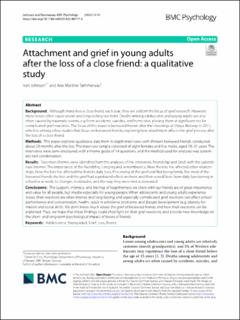| dc.description.abstract | Background
Although many lose a close friend each year, they are seldom the focus of grief research. However, these losses often cause severe and long-lasting reactions. Deaths among adolescents and young adults are also often caused by traumatic events, e.g. from accidents, suicides, and homicides, placing them at significant risk for complicated grief reactions. The focus of this paper is bereaved friends after the shootings at Utøya, Norway in 2011, which is among a few studies that focus on bereaved friends, exploring how attachment affects the grief process after the loss of a close friend.
Methods
This paper explores qualitative data from in-depth interviews with thirteen bereaved friends, conducted about 28 months after the loss. The interview sample consisted of eight females and five males, aged 18–31 years. The interviews were semi-structured, with a theme guide of 14 questions, and the method used for analyses was systematic text condensation.
Results
Two main themes were identified from the analyses of the interviews: Friendship and Grief, with the subordinate themes: The importance of the friendship, Longing and remembrance, How the loss has affected other relationships, How the loss has affected the friend’s daily lives, Processing of the grief and Not being family. For most of the bereaved friends the loss and the grief had a profound effect on them and their overall lives, from daily functioning in school or at work, to changes in attitudes, and the way they were met as bereaved.
Conclusions
The support, intimacy, and feelings of togetherness we share with our friends are of great importance and value for all people, but maybe especially for young people. When adolescents and young adults experience losses, their reactions are often intense and long-lasting, and especially complicated grief reactions can affect school performance and concentration, health, result in emotional problems; and disrupt development (e.g. identity formation and social skills). We don’t know much about the grief of bereaved friends and how their reactions can be explained. Thus, we hope that these findings could shed light on their grief reactions, and provide new knowledge on the short- and long-term psychological impact of losses of friends. | en_US |

